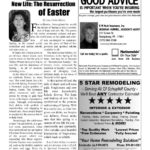
What of this Jesus, and his famous donkey ride?
It seems a bit strange, no?
What is called The Triumphal Entry is celebrated each year, on Palm Sunday, a week before the celebration of the Resurrection of Jesus Christ (most often called Easter, which a a variation of the name of a pagan god, but I digress.)
It’ll take you 45 seconds to read the short donkey ride story here: Matthew 21:1-9.
The crowds heading to Jerusalem for Passover feasting were caught up in the pandemonium of this celebrity sensation–a peasant healer from the boondocks, who had just raised a dead man, four days after he died (his friend Lazarus in the town of Bethany).
Hopes were high that this miracle-worker could liberate the Jews from their Roman oppressors. Some 250,000 lambs would be roasted, likely feeding more than 2 and a half million people during this festival. So, the throng was indeed enormous.
In virtual mob hysteria, hopeful Jews stripped nearby palm trees of their fronds, and threw their coats on the road to pave this unorganized and roisterous parade. A hundred years prior, war hero Simon Maccabaeus was welcomed in the same manner after his conquest over Syria. Now Jews again shouted “Hosanna”, which means “save we pray”. They yelled out the call from Psalm 118:26–a song of deliverance, conquest, and rescue.
Several times previously, Jesus had escaped the momentum of enthralled crowds who hoped to make him their rebel king by sheer force of mob will. Desperation was in the air. They longed for rescue, but Jesus was not that kind of King. He rebuffed all attempts at typical authority, political prestige, religious posturing, or military command. As he put it to Roman authorities, “My kingdom is not of this world.” He came mildly, to be a selected as our king of hearts, and to have victory over our sin and brokenness–reconciling us again to our Creator, a holy and good God.
Fulfilling a prophecy from Zechariah, hundreds of years earlier (Zechariah (9:9)), Jesus rode a plodding little colt of a donkey into the city. The colt was encouraged to continue by keeping its mother in the lead.
For Jews, the donkey was considered a conveyance for the noble classes, and ridden by Jewish priests or nobility. It was also a helpful metaphor to display the Prince of Peace–the true Savior. It drew a sharp contrast against the mood of the raucous Zealots.
This type of entry marked a vast difference from the Roman commanders who would ride in celebratory victory pageants atop their mighty war horses. Wagons full of pillaged gold and silver rode along with the procession through grand Roman archways. Musicians and carriers of fragrant incense would accompany the cavalcade. Captives and conquered enemy honchos were chained and paraded –all for vanity’s sake.
Many Jews hoped for the dream-Messiah of the military persuasion. That was the glory they wishes for.
Jesus was misunderstood in his entry. The mob would show its intrinsic fickleness when, just days later, in bitter disappointment, they would turn on their would-be Messiah, screaming “Crucify him! We have no king but Caesar!” to the local Roman governor, Pilate.
I have a spiritual challenge to give you this weekend. It is to respond in word and deed to this surprising action of God, in human form.
In Christian circles, this season is sometimes called, Holy Week. It has nothing to do with the week itself, but rather it refers to setting aside time to recount the stories and consider this Prince of Peace: his nature; his life and ministry to the needy, poor, and sick; his unjust execution; and the power of his Resurrection to life, witnessed by over 500 people.
Once confronted with this story that changed the world, each must ask, “Who is this Jesus?” and “How must I respond?” Are we willing to give our heart to this lowly yet almighty King, the Prince of Peace?
How will the life, death, and resurrection of Jesus, the Messiah change who you become? It is your saving grace.
Please share your thoughts, or Palm Sunday & Eastertide reflections.



